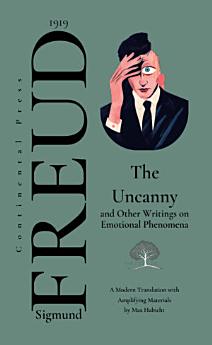The Uncanny
May 2024 · The Collected Complete Works of Sigmund Freud Book 6 · Continental Press
Ebook
118
Pages
family_home
Eligible
info
reportRatings and reviews aren’t verified Learn More
About this ebook
A modern rendering of Sigmund Freud’s 1919 essay The Uncanny (Das Unheimliche), a profound exploration of the eerie and unsettling sensations that arise when the familiar becomes strange. In this work, Freud delves into the psychological mechanisms behind the uncanny, examining how repressed childhood fears, desires, and memories resurface in adulthood to create feelings of unease and dread. Freud begins by analyzing the linguistic and etymological roots of the term unheimlich (uncanny), which literally means “unhomely” or “unfamiliar.” He argues that the uncanny arises when something that was once familiar and comforting—such as a childhood memory or a repressed desire—reappears in an unfamiliar or distorted form. This blurring of the boundary between reality and fantasy, the known and the unknown, triggers a sense of disorientation and fear. Freud explores various examples of the uncanny, including déjà vu, doppelgängers, and supernatural experiences, as well as their representation in literature and art. He pays particular attention to E.T.A. Hoffmann’s short story The Sandman, which features a terrifying figure who steals children’s eyes. Freud interprets this tale as an expression of castration anxiety and the fear of losing one’s sight, linking it to deeper unconscious conflicts. This essay is notable for its innovative application of psychoanalytic theory to the study of aesthetics and literature, as well as its exploration of the psychological roots of fear and fascination. Freud’s analysis of the uncanny has had a lasting impact on fields such as literary criticism, film studies, and cultural theory, influencing thinkers such as Jacques Lacan, Julia Kristeva, and Hélène Cixous. This fresh, modern translation from the original German manuscript breathes new life into this historically significant work. Freud’s extensive writings have often been inaccessible to the general reader, and this edition seeks to bridge that gap by providing direct access to his original ideas. The Reader’s Edition introduces Freud’s work in context, with an illuminating Afterword that explains his philosophical project, situates it within the Modernist milieu, and explores its enduring impact on contemporary thought. The Afterword also examines the relationship and intellectual conflict between Freud and Carl Jung, particularly their differing views on the interpretation of art and symbolism. While Freud emphasized the role of repressed desires and childhood experiences, Jung focused on the collective unconscious and archetypal symbols. Accompanied by a timeline of Freud’s life and works, an index of philosophical terminology, and a short biography, this edition is an indispensable resource for students, scholars, and anyone interested in the intersection of psychoanalysis, literature, and culture. The inclusion of supplemental materials, such as illustrations and a glossary of Freudian psychological terms, enhances the reader’s understanding of this complex and historically important work. Whether you are a seasoned scholar or a curious newcomer, this volume offers a comprehensive and accessible introduction to Freud’s groundbreaking theories on the uncanny and their enduring relevance to the study of human psychology.
About the author
Sigmund Freud (1856-1939) was an Austrian neurologist and the founder of psychoanalysis, a groundbreaking approach to understanding the human psyche. Freud introduced concepts such as the unconscious mind, repression, and the tripartite structure of the psyche, which includes the id, ego, and superego. His work, including seminal texts like The Interpretation of Dreams and Beyond the Pleasure Principle, emphasized the role of unconscious drives and childhood experiences in shaping behavior and personality. Freuds theories on sexuality, defense mechanisms, and dream analysis challenged societal norms and profoundly altered the field of psychology, influencing literature, art, and philosophy. Though controversial, his contributions laid the foundation for modern psychotherapy and continue to spark debates and inspire new approaches to understanding human behavior and mental processes.
Rate this ebook
Tell us what you think.
Reading information
Smartphones and tablets
Install the Google Play Books app for Android and iPad/iPhone. It syncs automatically with your account and allows you to read online or offline wherever you are.
Laptops and computers
You can listen to audiobooks purchased on Google Play using your computer's web browser.
eReaders and other devices
To read on e-ink devices like Kobo eReaders, you'll need to download a file and transfer it to your device. Follow the detailed Help Center instructions to transfer the files to supported eReaders.











